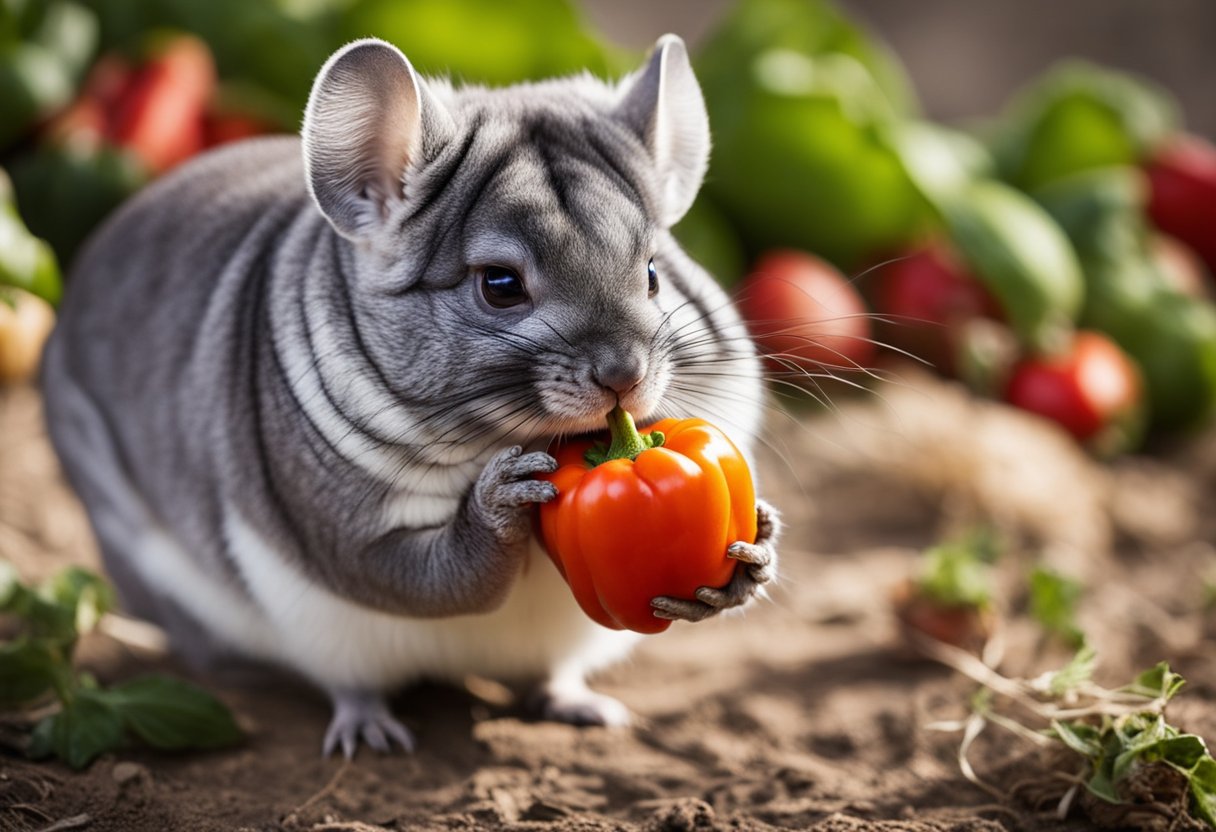As a chinchilla owner, you want the best for your pet. Chinchillas can eat bell peppers, but only in small amounts. This vegetable can be a tasty and nutritious treat when fed properly. However, it’s essential to understand how bell peppers fit into your chinchilla’s diet to keep them healthy.

Feeding your chinchilla a variety of vegetables is important for their well-being, but not all veggies are safe. Knowing which foods are suitable can help prevent digestive issues. In this article, you will learn about the benefits and risks of giving bell peppers to your chinchilla, along with tips for safe feeding practices.
By the end, you will feel more confident in your choices as a pet owner. You’ll gain valuable insights into your chinchilla’s dietary needs and how bell peppers can play a role while ensuring their health remains a top priority.
Key Takeaways
- Chinchillas can safely consume bell peppers in moderation.
- Understanding proper vegetable selection is key for your pet’s diet.
- Always monitor your chinchilla’s health when introducing new foods.
Chinchilla Dietary Needs

Understanding what chinchillas need in their diet is crucial for their health. You should focus on providing the right nutrients while avoiding harmful foods. Here are the essential nutrients that chinchillas require and the risks associated with an improper diet.
Essential Nutrients for Chinchillas
Chinchillas need a balanced diet that includes specific nutrients for optimal health. Key components include:
- Fiber: This is vital for digestive health. High-fiber hay, such as timothy or orchard grass, should be the main part of their diet.
- Protein: Chinchillas require moderate protein levels. Pellets formulated for chinchillas provide essential protein.
- Vitamins and Minerals: Include some fresh vegetables and specific treats, but sparingly. Calcium and phosphorus are important for strong bones.
Avoid sugary fruits and starchy foods. The right balance is essential for your chinchilla’s well-being.
Risks of Improper Diet
Feeding your chinchilla the wrong foods can lead to significant health problems. Some risks include:
- Obesity: Foods high in fat or sugar can cause weight gain. This can lead to serious health issues.
- Digestive Problems: A diet low in fiber can result in constipation or other gastrointestinal issues.
- Nutritional Deficiencies: Omitting essential vitamins and minerals can lead to weaknesses and illness.
Always introduce new foods gradually. Monitor your chinchilla for any adverse reactions when changing their diet. Consulting a veterinarian for dietary advice can help ensure you meet your chinchilla’s needs.
Evaluating Bell Peppers for Chinchillas

When considering bell peppers for your chinchilla, it’s important to look at their nutritional profile, the potential health benefits they offer, and certain feeding considerations. Understanding these factors will help you make informed decisions on including this vegetable in your pet’s diet.
Nutritional Profile of Bell Peppers
Bell peppers are low in calories and provide essential nutrients that can benefit your chinchilla. They contain significant amounts of vitamins A, C, and E, as well as specific antioxidants. This nutritional content can support your chinchilla’s immune system and overall health.
In addition, bell peppers have a water content of about 92%. While hydration is important, too much water can lead to digestive issues in chinchillas. Therefore, it is vital to introduce bell peppers gradually and monitor your pet’s response.
Here’s a simple breakdown of key nutrients often found in bell peppers:
| Nutrient | Amount per 100g |
|---|---|
| Calories | 20 |
| Vitamin C | 80 mg |
| Fiber | 1.7 g |
| Sugar | 2.4 g |
| Water Content | 92% |
Potential Health Benefits
Feeding bell peppers can offer several health benefits for your chinchilla. The high vitamin C content can boost your pet’s immune system, which is crucial for their health. Antioxidants in bell peppers may also help combat oxidative stress, keeping your chinchilla healthy and active.
Moreover, the fiber in bell peppers can support good digestion. Maintaining a healthy digestive system is key for chinchillas, as they are prone to gastrointestinal issues.
Keep in mind that moderation is essential. While bell peppers have benefits, they should never replace a chinchilla’s primary diet of hay and pellets.
Considerations for Feeding Bell Peppers
When introducing bell peppers into your chinchilla’s diet, there are some important points to consider. Always wash them thoroughly to remove any pesticides or chemicals. Cut the bell peppers into small pieces to make them easier for your chinchilla to eat.
It’s also crucial to remove the seeds and stem, as these parts can be tough on their digestive system. Start by offering small amounts and observe your chinchilla’s reaction.
If your pet shows signs of discomfort or digestive upset, discontinue feeding bell peppers and consult your veterinarian. Remember, bell peppers should be treated as an occasional treat rather than a staple in your chinchilla’s diet.
Resources
For additional information about feeding bell peppers to chinchillas, check these reliable articles:
- Can Chinchillas Eat Bell Peppers? (What You Need To Know)
- What Vegetables Can Chinchillas Eat? (Very Few Are Safe)
- Can Chinchillas Eat Bell Peppers? (The Definitive Guide)
Frequently Asked Questions

Feeding your chinchilla properly is vital for its health. Here are answers to common questions about their diet, focusing on safe vegetables, fruits, and foods to avoid.
What vegetables are safe for chinchillas to consume?
Chinchillas can eat a few specific vegetables safely. Some of the best options are kale, parsley, and bell peppers. Always introduce new vegetables gradually and in small amounts to monitor how your chinchilla reacts.
Are seeds from bell peppers safe for chinchillas?
It is best to avoid giving chinchillas bell pepper seeds. Seeds can be hard for them to digest and may lead to gastrointestinal issues. Always remove the seeds and stem before offering bell peppers to your chinchilla.
How often can chinchillas have bell peppers in their diet?
Bell peppers should be given to chinchillas only as an occasional treat. A small piece once or twice a week is enough. Too much can lead to digestive problems due to their sugar and water content.
What foods should be avoided to maintain a chinchilla’s health?
Certain foods can harm chinchillas. Avoid high-sugar fruits, nuts, and grains. Foods like chocolate, caffeine, and dairy products are also dangerous. Stick to a diet rich in hay and approved vegetables for better health.
Can feeding chinchillas carrots and apples pose any health risks?
Yes, both carrots and apples can be risky if given too often. Carrots have high sugar, while apples can lead to loose stools. Offer these treats sparingly and monitor your chinchilla’s health.
What are some fruits chinchillas enjoy that are also healthy for them?
Chinchillas can enjoy a few fruits in moderation. Suitable options include blueberries and strawberries, which are lower in sugar compared to other fruits. Always cut fruit into small pieces and limit their intake to avoid health issues.

